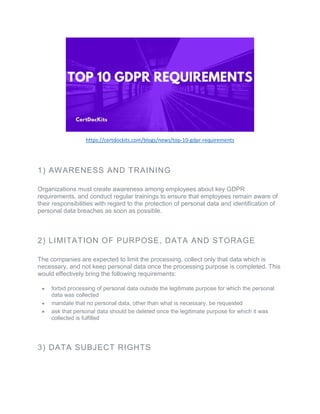
Top 10 GDPR Requirements
- 1. https://certdockits.com/blogs/news/top-10-gdpr-requirements 1) AWARENESS AND TRAINING Organizations must create awareness among employees about key GDPR requirements, and conduct regular trainings to ensure that employees remain aware of their responsibilities with regard to the protection of personal data and identification of personal data breaches as soon as possible. 2) LIMITATION OF PURPOSE, DATA AND STORAGE The companies are expected to limit the processing, collect only that data which is necessary, and not keep personal data once the processing purpose is completed. This would effectively bring the following requirements: • forbid processing of personal data outside the legitimate purpose for which the personal data was collected • mandate that no personal data, other than what is necessary, be requested • ask that personal data should be deleted once the legitimate purpose for which it was collected is fulfilled 3) DATA SUBJECT RIGHTS
- 2. The data subjects have been assigned the right to ask the company what information it has about them, and what the company does with this information. In addition, a data subject has the right to ask for correction, object to processing, lodge a complaint, or even ask for the deletion or transfer of his or her personal data. 4) CONSENT As and when the company has the intent to process personal data beyond the legitimate purpose for which that data was collected, a clear and explicit consent must be asked from the data subject. Once collected, this consent must be documented, and the data subject is allowed to withdraw his consent at any moment. You should start thinking now about whether you need to put systems in place to verify individuals’ ages and to obtain parental or guardian consent for any data processing activity. Also, for the processing of children’s data, GDPR requires explicit consent of the parents (or guardian) if the child’s age is under 16. 5) PERSONAL DATA BREACHES The organizations must maintain a Personal Data Breach Register and, based on severity, the regulator and data subject should be informed within 72 hours of identifying the breach. 6) PRIVACY BY DESIGN Companies should incorporate organizational and technical mechanisms to protect personal data in the design of new systems and processes; that is, privacy and protection aspects should be ensured by default. 7) DATA PROTECTION IMPACT ASSESSMENT To estimate the impact of changes or new actions, a Data Protection Impact Assessment should be conducted when initiating a new project, change, or product. The Data Protection Impact Assessment is a procedure that needs to be carried out when a significant change is introduced in the processing of personal data. This change could
- 3. be a new process, or a change to an existing process that alters the way personal data is being processed. 8) DATA TRANSFERS The controller of personal data has the accountability to ensure that personal data is protected and GDPR requirements respected, even if processing is being done by a third party. This means controllers have the obligation to ensure the protection and privacy of personal data when that data is being transferred outside the company, to a third party and / or other entity within the same company. 9) DATA PROTECTION OFFICER When there is significant processing of personal data in an organization, the organization should assign a Data Protection Officer. When assigned, the Data Protection Officer would have the responsibility of advising the company about compliance with EU GDPR requirements. 10) LAWFUL, FAIR AND TRANSPARENT PROCESSING The companies that process personal data are asked to process the personal data in a lawful, fair and transparent manner. Now, what does this mean? Let us understand this: • Lawful means all processing should be based on a legitimate purpose. • Fair means companies take responsibility and do not process data for any purpose other than the legitimate purposes. • Transparent means that companies must inform data subjects about the processing activities on their personal data. You can be ready now. Get started with our free GDPR assessment. https://certdockits.com/collections/all